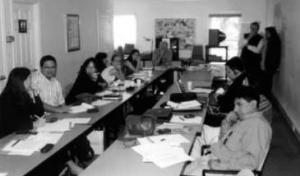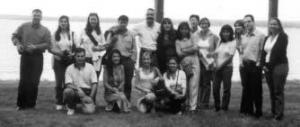ICAR Workshops and Projects
Third Organization of American States Summer Workshop: “The Role of the Media in Conflict Analysis and Resolution”
By Chris Mitchell, ICAR Faculty Member
 The Third Institute for Conflict Analysis and Resolution Organization of American States Summer School for Latin American participants were held at George Mason University during June, and was attended by 15 selected journalists, government advisers, media presenters, and executives and academics from departments of media and communications.
The Third Institute for Conflict Analysis and Resolution Organization of American States Summer School for Latin American participants were held at George Mason University during June, and was attended by 15 selected journalists, government advisers, media presenters, and executives and academics from departments of media and communications.
Countries represented included Argentina, El Salvador, Bolivia, Colombia, Peru, and Guatemala. The workshop was organized and moderated by Chris Mítchell, by ICAR alumnus Jannie Botes, formerly of the South African Broadcasting Service, and by the chairperson of the ICAR Latin American and Caribbean Working Group, Giselle Humani Ober.
The two photographs show the workshop in session in the ICAR Conference Room (Botes and Ober are standing at the back); and the whole group photographed between rain showers at the institute’s future retreat, research, and conference center at “Point of View” on Mason Neck.
Putting Philosophical Ideas to Work
By Daniel Rothbart, ICAR Faculty Member
Following his appointment as a Fenwick Fellow, 2000-2001, Daniel Rothbart presented the Fenwick Lecture on November 19, 2001. The substance of this lecture was drawn from his book-length manuscript, titled Philosophical Instruments, currently under review. In his lecture, “Putting Philosophical Ideas to Work,” he examined a familiar philosophical issue from an unfamiliar perspective, that is, how can we ever know what there is in the world if all sources of knowledge are, at best, fallible, and at worst, illusory? In most philosophical discussions about knowledge, the topic of skill is virtually absent. But based on an ecological notion of experimental skill, certain pivotal philosophical ideas about the relationships between experimenters and the environment are revealed.
 Such ideas are themselves used as instruments in the pursuit of knowledge. The notion of a philosophical instrument is introduced. An experimental skill is definable through three kinds of activity. First, an agent with a skill has a power to produce changes in the features of an environment, that is, a goal-oriented capacity to change other beings.
Such ideas are themselves used as instruments in the pursuit of knowledge. The notion of a philosophical instrument is introduced. An experimental skill is definable through three kinds of activity. First, an agent with a skill has a power to produce changes in the features of an environment, that is, a goal-oriented capacity to change other beings.
Such power rests on the total field of relations integrating body and mind in a richly structured environment. An agent chooses to release a power under certain circumstances, but such power can be blocked, or restricted by other agents with power. Second, a skilled agent must have an awareness of their potential influences on an environment, imagining how the course of events could change, and how the environment could be influenced through possible action. Agents “move beyond themselves” by constructing images of where they are going (based on goals), and how to get there (based on instruments).
Such images are conveyed through visual models of the subject matter under examination. Third, a skilled agent must be capable of evaluating their results by comparing the product of an action to a desired goal.





